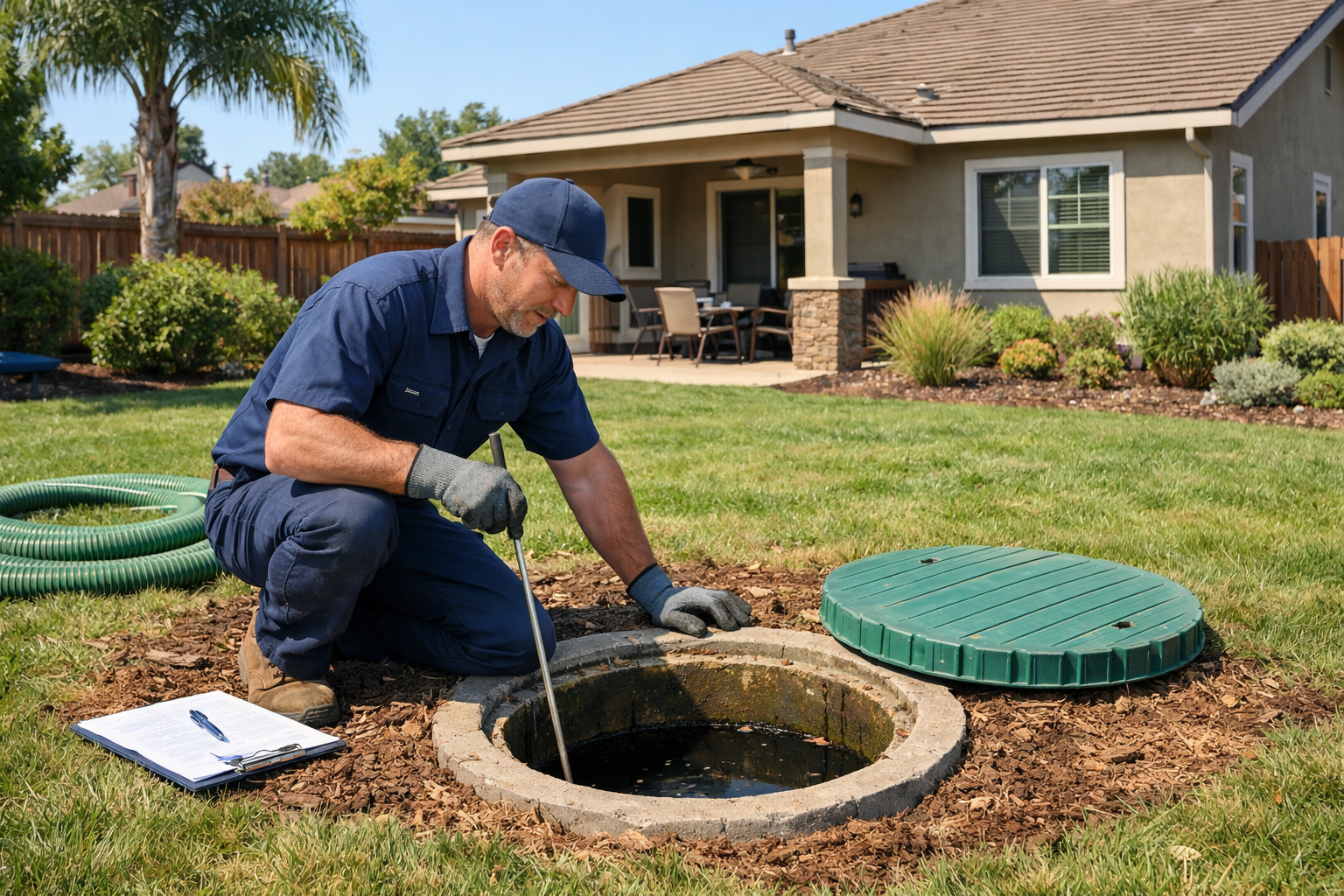Have you ever wondered what’s happening beneath your backyard? Most of the time, septic systems are out of sight and out of mind—until a strange odor or slow-draining sink signals something is wrong. Your septic tank plays a vital role in managing household wastewater, and ignoring small warning signs can lead to costly septic repair or even full septic replacement.
Your septic tank acts like the silent workhorse of your plumbing system. It processes waste daily, and while it usually functions unnoticed, routine septic maintenance is essential to keeping it efficient. With regular septic tank cleaning and pumping, you can prevent buildup, protect your yard, and extend your system’s overall lifespan. Small, proactive actions such as following septic care tips, using septic safe products, and sticking to a septic tank inspection schedule help you avoid emergencies and save money.
This guide highlights eight clear signs that determine whether your system is in good shape or in need of professional attention. By the end, you’ll understand how to recognize issues, prevent expensive failures, and take steps like septic odor control and septic backup prevention to keep your septic system healthy and efficient for years to come.
Understanding Septic Systems: A Quick Background
Septic systems are not a modern convenience but a long-evolved solution for household wastewater. Before centralized sewage, homeowners relied on pits and cesspools. Over time, the design improved into the septic system we use today, which provides safe, reliable, and environmentally conscious waste management.
At the heart of the system is the septic tank, an underground container that separates solids from liquids. Septic bacteria and septic enzymes break down organic matter inside the tank, allowing treated water to flow into the septic leach field for final filtration.
Modern septic system design considers not just capacity but also durability and sustainability. Many homeowners now use septic additives to boost microbial health, follow a strict septic tank inspection schedule, and install septic risers and lid replacements for easier maintenance access. Population growth in semi-rural areas has also increased reliance on septic systems, making septic maintenance a major responsibility for homeowners.
By understanding this history and evolution, you can better appreciate why systems require regular septic pumping and occasional upgrades. With new technologies like septic tank alarms and eco-friendly septic treatment tablets, septic care is becoming smarter and more proactive.
The Core Elements of a Healthy Septic System
A truly healthy septic system operates so quietly you barely notice it. When functioning correctly, it avoids foul odors, soggy patches in your yard, or backups into your home. Proper septic maintenance and septic cleaning ensure everything flows smoothly, while septic backup prevention practices reduce costly emergencies.
Key elements of a reliable system include:
- The Septic Tank – Separates solids from liquids and relies on septic bacteria for septic tank waste breakdown.
- Beneficial Bacteria Balance – Maintains septic tank efficiency and prevents premature buildup.
- The Drain Field – Disperses filtered water, though issues may require septic drain field repair.
- Regular Maintenance – Scheduling septic pumping near me saves money compared to septic tank replacement cost.
- Water Usage Habits – Conserving water extends septic system lifespan.
- Eco-Friendly Products – Choosing septic safe products and septic tank treatment products protects balance.
When all these parts work together, your system lasts for decades. Ignoring one element—like skipping septic filter cleaning—can lead to failure that impacts the entire system. For example, overloading the tank increases septic system cost and damages the septic leach field, sometimes requiring specialized help like lift station pumping or outlet repairs.
Why Keeping Your Septic System Healthy Pays Off
A septic system may not seem glamorous, but it’s one of the most valuable investments in your home. Staying consistent with septic maintenance, regular septic inspection, and timely septic pumping not only protects your property but also saves you from huge financial setbacks. Skipping routine care can mean paying thousands in septic replacement or septic system installation cost later.
Here are the benefits of keeping your system healthy:
- Cost Savings – Inspections by reliable septic system contractors prevent major issues.
- Protects Property – A functioning tank avoids the need for emergency septic repair and stops yard flooding.
- Environmental Safety – Using septic treatment tablets reduces groundwater contamination.
- Improved Value – Homes with dependable septic systems and working septic tank alarms sell faster.
- Peace of Mind – Septic odor control and septic backup prevention mean fewer surprises.
- Longer Lifespan – Following a septic system maintenance guide maximizes durability.
For example, catching a small clog early might cost under $200, while ignoring it could result in a $5,000 septic drain field repair. Some problems—like damaged baffles—can also be avoided if you invest in tank locating and outlet baffle replacement before they escalate. Proactive care isn’t just a chore—it’s an investment that pays off.
Recognizing and Managing Septic System Challenges
Even with the best septic maintenance, challenges arise. Homeowners often face unexpected expenses, like replacing septic tank covers, upgrading with septic risers, or managing sudden septic tank pumping cost increases. Environmental factors such as flooding or poor soil conditions can also shorten septic system lifespan and lead to costly septic repair.
Here are some common issues and strategies to manage them:
- Routine Costs – Budget for inspections, septic pumping, and occasional septic filter cleaning.
- Unexpected Repairs – Keep contacts for septic tank repair near me and septic cleaning near me handy.
- Environmental Sensitivity – Prepare for heavy rainfall that stresses the septic leach field.
- System Limitations – Some properties may require specialized septic system design.
Working with a professional septic service company ensures you catch small issues early, whether it’s replacing faulty septic tank alarms or managing septic system cost for future upgrades. With proactive planning and septic care tips, most problems can be handled before they escalate into emergencies.
Putting Septic System Care Into Action
Maintaining a septic system doesn’t require being an expert, just consistent effort. Simple practices like scheduling inspections, sticking to a pumping schedule, and using septic safe products make a world of difference. Even small steps like proper septic filter cleaning or installing septic tank alarms can prevent bigger problems.
Here’s a simple step-by-step approach:
- Schedule regular septic inspection every 3–5 years.
- Keep up with septic pumping near me recommendations to avoid overflows.
- Follow septic tank safety tips to prevent accidents.
- Use septic tank treatment tablets and septic tank treatment products for bacterial balance.
- Protect the septic leach field by avoiding heavy loads or planting deep-rooted vegetation nearby.
By applying these practices, you reduce the likelihood of costly septic replacement and extend your septic system lifespan. A little effort now ensures fewer emergencies, lower septic system cost, and peace of mind later.
The Future of Septic System Care and Innovation
Septic systems may feel traditional, but innovation is reshaping them. Smart-home technology now integrates with septic tank alarms to monitor performance in real time. Homeowners can use apps that track pumping schedules or alert them to rising tank levels. Eco-friendly septic additives and septic tank treatment products are also becoming more effective at maintaining bacterial health without harming the environment.
Looking ahead, septic system contractors will offer advanced services, including upgrades to modern septic system design and cost-efficient solutions for aging systems. Regulations may also require stricter adherence to septic tank inspection schedules and septic system installation cost planning, making regular septic maintenance even more important.
As these technologies spread, it will become easier for homeowners to access septic cleaning near me services or emergency septic repair near me when needed. By staying informed and proactive, you can embrace innovations that improve efficiency, reduce environmental impact, and extend your septic system lifespan.
Bringing It All Together: Your Path to a Healthy Septic System
We’ve covered the fundamentals of septic systems, from how they work to why they matter and the steps you can take to keep them in peak condition. The message is simple: septic maintenance and septic inspection today prevent costly septic replacement tomorrow.
Here’s a quick recap of what matters most:
- Understand your system with a septic tank inspection schedule.
- Avoid emergencies through septic backup prevention and septic odor control.
- Use septic safe products and septic care tips for long-term balance.
- Work with trusted septic service companies and reliable septic system contractors.
By following these steps, you protect your investment, safeguard your family’s health, and extend the life of your septic system. Consistency is key, and even small actions—like septic filter cleaning or budgeting for septic tank pumping cost—build toward lasting reliability. And if you’re preparing to sell a property, always remember to schedule a real estate septic system inspection with a full report to ensure peace of mind for both you and potential buyers.
A Final Word on Septic System Awareness
Caring for a septic system may not be glamorous, but it’s essential to your home’s comfort and value. By practicing consistent septic maintenance, scheduling timely septic pumping, and taking advantage of tools like septic tank alarms, you ensure your system stays reliable. Investing in septic cleaning near me services or eco-friendly septic tank treatment tablets now saves you from future headaches and high septic replacement cost.
Remember: every action you take—whether it’s installing septic risers, checking septic tank covers, or using septic odor control—contributes to a healthier home environment. Staying proactive not only lowers septic system cost but also extends septic system lifespan, keeping your property safe and efficient for decades.
With this mindset, you can confidently care for your septic system, knowing you’re protecting your home, your budget, and your family’s health.






